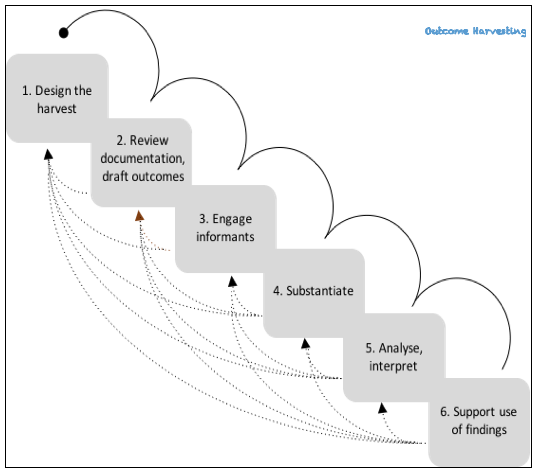I am Ricardo Wilson-Grau, an independent evaluator based in Rio de Janeiro who over the last 15 years developed, with colleagues, the Outcome Harvesting approach to monitoring and evaluating development and social change interventions. I devote a fourth of my time to sharing and learning, including supporting these and other colleagues to use Outcome Harvesting.
As an approach to evaluate interventions that operate in complex, dynamic and diverse environments, this utilization-focused and highly participatory approach requires that the six steps of Outcome Harvesting be customized for each evaluation design and adapted in the course of the evaluation process. Suffice to say that in over fifty evaluations, I have never applied Outcome Harvesting the same way.
Consequently, I have found in my own practice and in that of colleagues that the need to mold and adapt to different client needs and contexts, tends to undermine fidelity to the principles underlying each of the six methodological steps —you can modify or skip one or more the steps but only if you maintain the principles. For example, you can define outcomes in different ways just so long as they are understood as observable, demonstrated changes in behavior. Similarly, an outcome can only be considered a product of an intervention if you can establish a plausible cause-effect contribution, but not attribution. A third example: substantiation is unnecessary if the original data is credible enough for the intended uses. That is, faulty application of Outcome Harvesting is due mainly to evaluators misunderstanding, misusing, or simply not taking into account principles such as these. And, success in using Outcome Harvesting generally flows from being true to the principles, in my experience at least.
Lesson Learned: The solution I am pursuing is to emphasize Outcome Harvesting as a principles-focused evaluation approach, flushing out and promoting the use of ten principles that are the methodological foundation of the approach.
Rad Resources: For Outcome Harvesting resources, examples of applications to monitoring and evaluation, and a calendar of events, visit this website I maintain to influence the quality and support fellow practitioners. To compare and contrast Outcome Harvesting with other utilization-focused, participatory and complexity-aware approaches to evaluation, visit Better Evaluation.
Hot Tip: In addition to visiting the website and reading Chapter 32 about Outcome Harvesting in Michael Quinn Patton’s book Principles-Focused Evaluation — The Guide, participate in the Outcome Harvesting Forum that is influencing fidelity to the principles and forging a community of practice.
The American Evaluation Association is celebrating Principles-Focused Evaluation (PFE) week. All posts this week are contributed by practitioners of a PFE approach. Do you have questions, concerns, kudos, or content to extend this aea365 contribution? Please add them in the comments section for this post on the aea365 webpage so that we may enrich our community of practice. Would you like to submit an aea365 Tip? Please send a note of interest to aea365@eval.org . aea365 is sponsored by the American Evaluation Association and provides a Tip-a-Day by and for evaluators.

